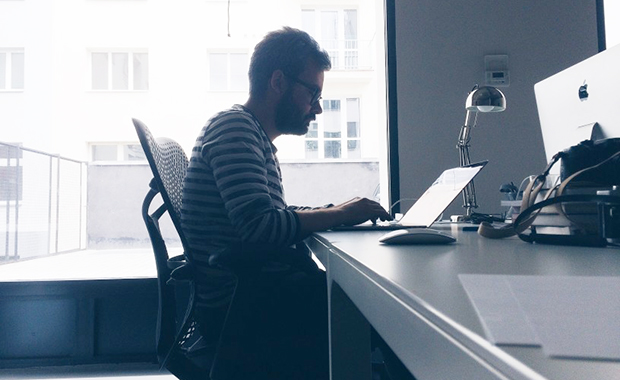Success Advice
4 Easy Ways to Develop a Bias for Action Right Now

Let me guess, you’ve been putting something off recently. You’ve been dreaming of starting a business, writing a book, or talking to that attractive person in your office, but something deep inside you has stopped you from taking action.
The human mind is fantastic at coming up with reasons for not taking action. The human brain is designed to keep us safe and to conserve energy. For that reason, we are programmed to look for risks and reduce the amount of work we need to do to in order to survive. When we weigh any potential action, we look for reasons that specific action or activity will fail. At the same time, we look for ways that we can conserve energy and get the same benefit from less effort.
What this means is that those who are able to act in an incisive way and focus their energy, have a tremendous advantage compared to their peers. Research shows that those who are able to develop the habit for action are many times more likely to be successful in business and in their relationships than people who describe themselves as procrastinators or are unable to take regular action.
This habit is called the “bias for action”, and it refers to the tendency to make decisions quickly and take action on them regularly rather than getting side tracked by worry or doubt. But how do you develop such a valuable habit? Through practice, plain and simple.
Here are four ways to develop a bias for action which will jump start your life:
1. Reduce distractions
One of the biggest reasons that people cite for not taking action is because they are overwhelmed by the number of things going on in their lives that they have to decide on. The more you are able to reduce the number of distractions you have in your life, the more you will be able to focus on what matters to you.
Consider turning off all of your mobile phone notifications except for those you absolutely cannot live without. Get better at saying no to people who invite you to events and activities. Learn to live within your means and conserve energy for what actually matters most to you.
“Work is hard. Distractions are plentiful. And time is short.” – Adam Hochschild
2. Count down from five
If you get stuck and start overthinking anything, you are less likely to make a move and act. One of the best books I’ve ever read on taking action is called The Five Second Rule by Mel Robbins. In the book, she describes a moment in her life where everything seemed to be falling apart.
She was 41, she was drinking too much, her work / life balance was nonexistent, and her marriage was falling apart. Things were not going well, and she knew something had to change. Sitting up late one night, she was watching TV and happened to see a clip of a rocket preparing for blastoff, with the requisite “Five… four… three… two… one… blast off” sounding off in the background. With that, she decided to implement the practice of counting down from five every time she knew she needed to take action on something but couldn’t.
3. Make smaller decisions
Most self-help books talk about developing a grand master plan and some overarching vision which will guide you and drive you forward. Sure, having a unifying mission and vision can be a great way of helping you define your far-off goals, but it can also be overwhelming when you’re just trying to live your everyday life.
If you have a high level goal or vision, that’s great, but don’t forget the importance of taking action every day on smaller things. Make it a goal to do something that is beneficial to your mind (read a book, talk to a mentor), your body (go for a run or a 30 minute walk), and your soul (meditate, go to a museum, or see an old friend) each and every day. The long term goals are important, but they won’t matter unless you manage to make the right smaller decisions on a daily basis.
“No matter how many goals you have achieved, you must set your sights on a higher one.” – Jessica Savitch
4. Create a decision engine
Once you start making decisions on a regular basis, the process will become addictive. Habits are made out of loops. There is a trigger which causes an action (habit). Upon completing that action (habit), you receive a reward, which releases dopamine into the brain. This, in turn, makes you seek out opportunities to engage with that initial trigger.
In order to create a strong habit around the “bias for action”, you need to create a system which helps to formalise that habit loop. Look for what trigger might push you to take action. Maybe you’re trying to lose weight and you want to go for a run each morning. Putting your shoes by the foot of your bed might be the motivation you need to get up and run first thing in the morning.
Maybe you need to get better about completing your work assignments on time, so you set aside two hours each Monday morning of uninterrupted time to plan out your week and schedule your most important actions. Whatever systems you put in place, make sure to make them as simple as you can. The more complex your plans are for jump starting your action habit, the less likely it will be to succeed in the long run. You don’t need a grand plan, you just need to start now.
How do you make decisions quickly and efficiently on a daily basis? Let us know in the comments below!
Image courtesy of Twenty20.com
Business
Why Smart Entrepreneurs Are Quietly Buying Gold and Silver
When stocks, property, and cash move together, smart business owners turn to one asset that plays by different rules.

You’ve built your business from the ground up. You know what it takes to create value, manage risk, and grow wealth. But here’s something that might surprise you: some of the most successful entrepreneurs are quietly adding physical gold and silver to their portfolios. (more…)
Business
The Simple Security Stack Every Online Business Needs
Most small businesses are exposed online without realising it. This simple protection stack keeps costs low and risks lower.

Running a business online brings speed and reach, but it also brings risk. Data moves fast. Payments travel across borders. Teams log in from homes, cafés, and airports. (more…)
Business
If Your Business Internet Keeps Letting You Down, Read This
From smoother operations to better security, dedicated internet access is quietly powering today’s high-performing businesses.

Today, a dependable internet service is the bedrock for uninterrupted business operations. Many organizations rely on stable online connections for communication, data transfer, and customer interaction. (more…)
Did You Know
How Skilled Migrants Are Building Successful Careers After Moving Countries
Behind every successful skilled migrant career is a mix of resilience, strategy, and navigating systems built for locals.

Moving to a new country for work is exciting, but it can also be unnerving. Skilled migrants leave behind familiar systems, networks, and support to pursue better job opportunities and a better future for their families. (more…)
-

 News4 weeks ago
News4 weeks agoBrandon Willington Builds 7-Figure Business by Ignoring Almost Everything
-

 Health & Fitness4 weeks ago
Health & Fitness4 weeks agoWhat Minimalism Actually Means for Your Wellness Choices
-

 Did You Know4 weeks ago
Did You Know4 weeks agoWhy Most Online Courses Fail and How to Fix Them
-

 Business4 weeks ago
Business4 weeks agoIf Your Business Internet Keeps Letting You Down, Read This
-

 Business3 weeks ago
Business3 weeks agoEntrepreneur’s Guide to Pay Stubs: Why Freelancers and Small Business Owners Need a Smart Generator
-

 Business2 weeks ago
Business2 weeks agoThe Salary Shift Giving UK Employers An Unexpected Edge
-

 Scale Your Business2 weeks ago
Scale Your Business2 weeks ago5 Real Ways to Grow Your User Base Fast
-

 Business2 weeks ago
Business2 weeks agoThe Simple Security Stack Every Online Business Needs



























2 Comments